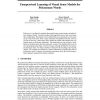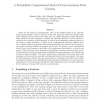250 search results - page 16 / 50 » Learning Probabilistic Models of Word Sense Disambiguation |
140
click to vote
EMNLP
2010
14 years 11 months ago
2010
We describe a model for the lexical analysis of Arabic text, using the lists of alternatives supplied by a broad-coverage morphological analyzer, SAMA, which include stable lemma ...
132
click to vote
COLING
2010
14 years 8 months ago
2010
Active learning has been applied to different NLP tasks, with the aim of limiting the amount of time and cost for human annotation. Most studies on active learning have only simul...
104
click to vote
NIPS
2008
15 years 3 months ago
2008
Polysemy is a problem for methods that exploit image search engines to build object category models. Existing unsupervised approaches do not take word sense into consideration. We...
119
Voted
GRAMMARS
2002
15 years 1 months ago
2002
Recent models of natural language processing employ statistical reasoning for dealing with the ambiguity of formal grammars. In this approach, statistics, concerning the various li...
118
click to vote
COGSCI
2010
15 years 1 months ago
2010
Words are the essence of communication: they are the building blocks of any language. Learning the meaning of words is thus one of the most important aspects of language acquisiti...


